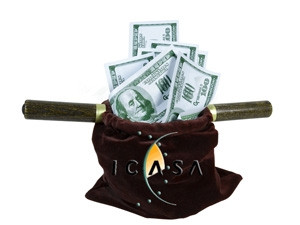
The Independent Communications Authority of SA (ICASA) is in a quandary when it comes to spectrum fee payment from certain government entities.
The authority - SA's historically under-resourced telecoms, broadcasting and postal services regulator - has more than R237 million due to it in spectrum licence fees as of July, a scenario ICASA attributes to struggling government entities.
"Billing is not an issue for ICASA. It is the collection - especially from government entities [that] are cash-strapped that poses a challenge," it says.
This causes a catch-22 for the regulator, as it cannot seal equipment of government entities that provide crucial services, such as the SA Police Service (SAPS) and SA National Defence Force (SANDF) - which owe R20.9 million and R182.4 million, respectively, for spectrum licence fees.
In terms of the law, ICASA is required to determine and collect a range of fees. Broadly speaking, these can be divided into spectrum fees; annual contributions by licensees to the Universal Service and Access Fund; fees related to specific processes (such as licence application fees, numbering fees, fees for renewing licences, etc); and penalties for breach of the ICASA Act, licence conditions and/or any regulations in place.
According to ICASA, the SAPS and SANDF have been in dispute over the fees they owe the authority for more than two years. All entities holding spectrum licences are obliged to pay their fees for the coming year, upfront, by March each year.
Earlier this year, ICASA CEO Pakamile Pongwana suggested the authority come up with a different means of charging non-commercial entities - specifically the state-owned bodies that do not use spectrum for profit, but for security. Ponogwana said there was a need for a charging method that covers the costs of ensuring there is no interference with state security signals.
Political fix
Dominic Cull, owner of Ellipsis Regulatory Solutions, says it is a vicious circle: "The state can't collect the money the state owes the state."
A solution, he says, would be for government to determine that entities providing essential services do not need to pay spectrum licence fees, which remain in the "government circle" in any case. "This is an issue ICASA cannot resolve for itself; it requires a political resolution and the minister [of communications] has the mechanism to do this. How you solve it, is you get the politicians to do their jobs."
ICASA spokesperson Paseka Maleka says the authority "believes the National Treasury will assist ICASA with this challenge".
Marian Shinn, Democratic Alliance shadow minister for telecoms and postal services, says the issue is one that is "perpetually unresolved", and there seems to be little drive by the leadership of ICASA, its council, to drive a resolution.
"When the government entities were granted their licences they were well aware that fees were due. If they felt there was some reason why they should get a friends-of-the-family rate perhaps that was the time to motivate for it. But they didn't. They either accepted the fee structure on issue or never had any intention of paying.
"Because ICASA lacks the backbone to run its business on a viable financial footing, it now expects the taxpayer - via Treasury - to foot the bill for tardy government entities who feel entitled to services for free because they run emergency services. Do their staff work for free in the interests of this noble cause? Do they not pay their other suppliers?"
Shinn says, when the selection for new ICASA councillors comes up towards the end of the year, "this will be the time for the communications portfolio committee to insist people with appropriate backbone and sense of purpose in putting ICASA on a sound financial footing are chosen".
Share